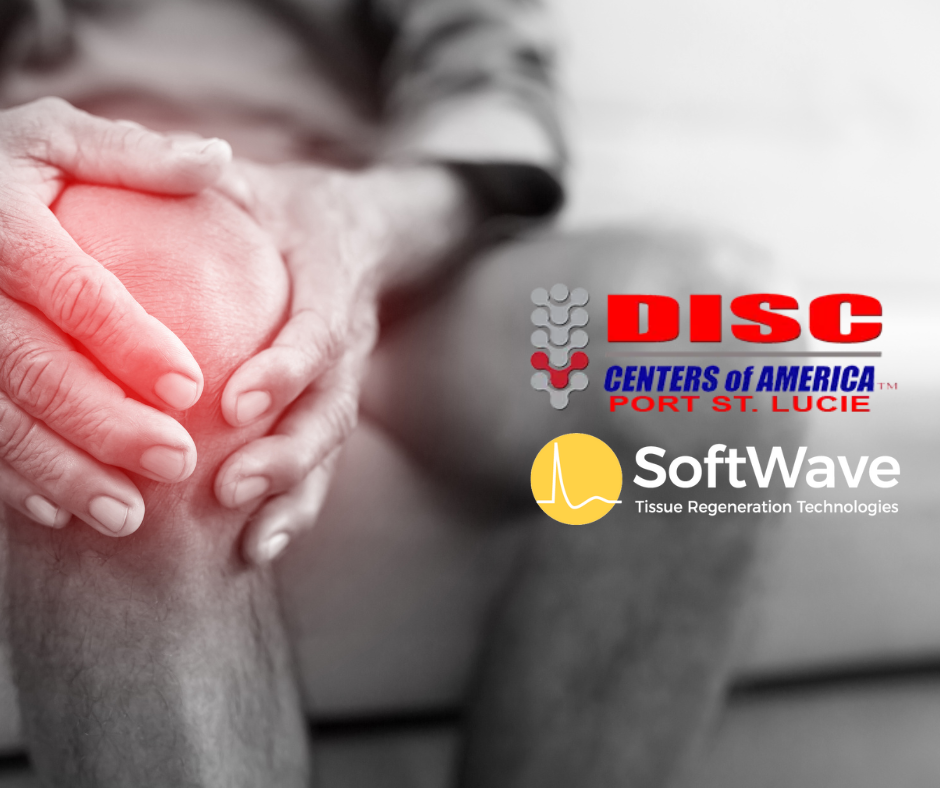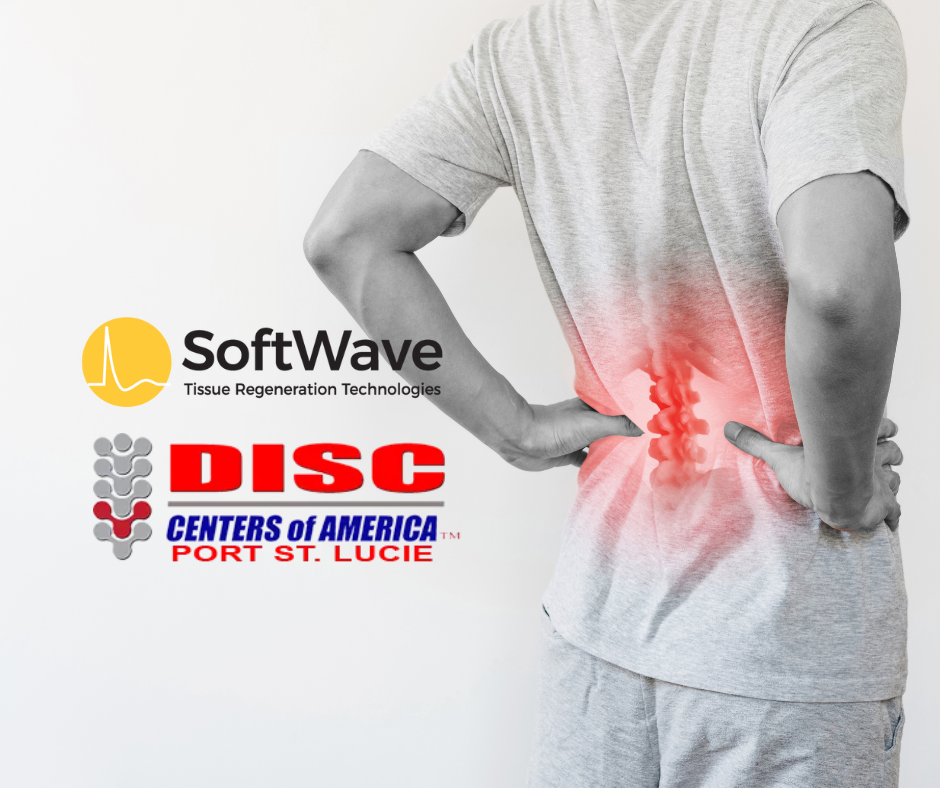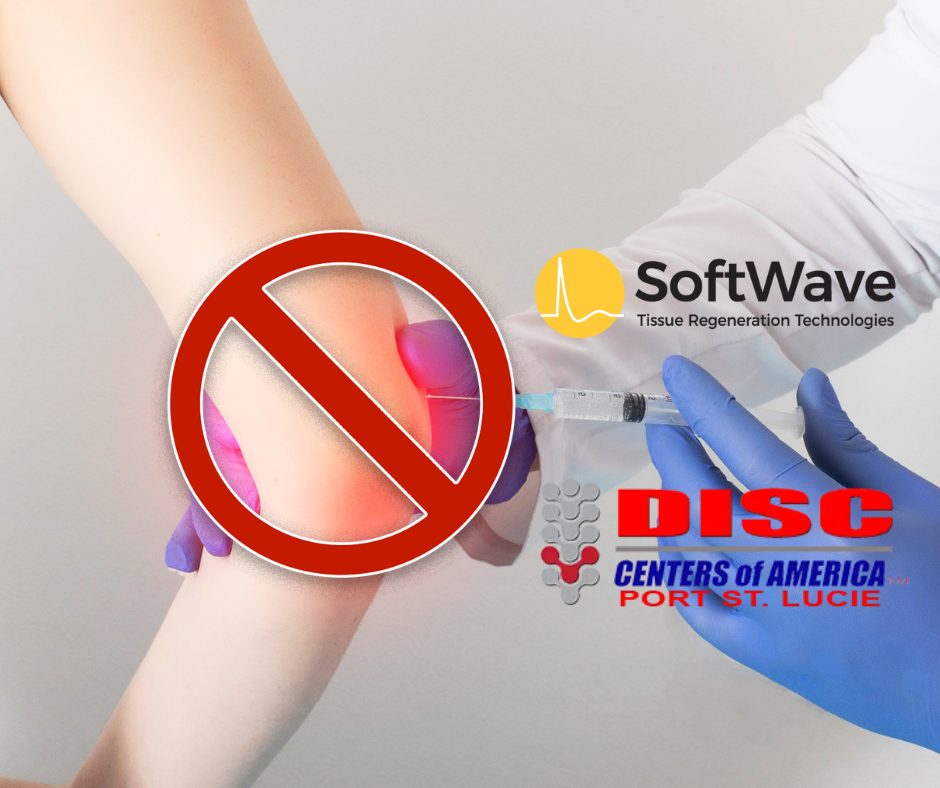Blog
Healing Meniscus Tears Naturally Without Surgery or Injections: A Non-Invasive Approach with Dr. John Grassam

A meniscus tear in the knee can be a painful and limiting injury, but many people are looking for non-surgical solutions to heal and return to their normal activities. At Disc Centers of America - Port St. Lucie, Dr. John Grassam offers a natural, non-invasive alternative to surgery for meniscus tears through SoftWave Tissue Regeneration Technology. This advanced therapy promotes healing, repair, and regeneration, helping patients recover from meniscus tears without the need for invasive procedures.
In this blog, we’ll explore the anatomy of the knee, the causes and symptoms of meniscus tears, and how SoftWave Therapy can help you heal naturally and get back to doing the things you love.
Understanding the Anatomy of the Knee and Meniscus
The knee is a complex joint that connects the femur (thigh bone) to the tibia (shin bone) and patella (kneecap). The joint is stabilized by ligaments and supported by cartilage, which cushions the bones and allows smooth movement.
The meniscus is a C-shaped piece of cartilage located between the femur and tibia on both the inner and outer sides of the knee. The menisci (plural of meniscus) act as shock absorbers, helping to distribute weight across the knee joint and prevent bone-on-bone contact. Each knee has two menisci:
- Medial meniscus: Located on the inner side of the knee.
- Lateral meniscus: Located on the outer side of the knee.
The menisci are crucial for joint stability and smooth movement, but they are also susceptible to injury, particularly from twisting motions or excessive force.
What Causes a Meniscus Tear?
A meniscus tear occurs when the cartilage is torn due to injury or degeneration. These tears can range from small, minor tears that heal naturally over time to larger, more severe tears that can cause ongoing pain and dysfunction.
Common Causes of Meniscus Tears:
- Sudden twisting or pivoting movements: This often occurs during sports or activities that require sharp, quick movements, such as basketball, tennis, or soccer.
- Trauma or impact: A direct blow to the knee, such as from a fall or collision, can tear the meniscus.
- Age-related degeneration: As we age, the meniscus becomes less flexible and more prone to tears, even from minor movements.
- Repetitive stress: Over time, repetitive movements or heavy lifting can cause wear and tear on the meniscus, leading to injury.
Symptoms of a Meniscus Tear
A meniscus tear can cause a variety of symptoms, depending on the severity of the injury. Common symptoms include:
- Pain in the knee: The pain may be localized to the inner or outer side of the knee, depending on which meniscus is affected.
- Swelling: Inflammation and swelling often occur after the injury, particularly within the first 24-48 hours.
- Stiffness or limited range of motion: The knee may feel stiff, making it difficult to bend or fully extend the leg.
- Catching or locking of the knee: Some patients experience a sensation that the knee is “catching” or locking up during movement.
- Instability: A torn meniscus can make the knee feel unstable or give way when walking or bearing weight.
If left untreated, a meniscus tear can lead to chronic pain and increase the risk of further injury, which is why prompt treatment is essential.
Healing Meniscus Tears Naturally with SoftWave Therapy
For patients seeking a non-surgical solution to heal a meniscus tear, SoftWave Tissue Regeneration Technology offers a powerful, non-invasive alternative. This advanced therapy uses supersonic acoustic waves to stimulate tissue repair and regeneration, promoting long-term healing without the need for surgery or injections.
1. Stimulating Stem Cells for Tissue Repair
One of the primary benefits of SoftWave Therapy is its ability to activate the body’s resident stem cells, which play a crucial role in tissue repair. The acoustic waves delivered during SoftWave Therapy help:
- Activate stem cells: The therapy stimulates the body’s natural healing mechanisms by activating stem cells and encouraging them to migrate to the injured area.
- Promote tissue regeneration: By promoting cellular repair, SoftWave Therapy helps regenerate the damaged cartilage in the meniscus, allowing it to heal naturally over time.
- Accelerate recovery: Patients often experience faster recovery compared to traditional treatments, allowing them to return to activity sooner.
By supporting the body’s natural healing process, SoftWave Therapy offers a drug-free and non-surgical solution for meniscus tears, helping patients avoid invasive procedures.
2. Reducing Inflammation and Alleviating Pain
Meniscus tears often result in significant inflammation and pain in the knee. SoftWave Therapy works to modulate inflammation by promoting the release of anti-inflammatory molecules and reducing the production of pro-inflammatory cytokines. This helps:
- Reduce pain: Many patients experience immediate relief from pain during or shortly after their first SoftWave session.
- Decrease swelling: By reducing inflammation, SoftWave Therapy helps decrease swelling and improve mobility in the knee joint.
The ability to reduce inflammation and pain makes SoftWave Therapy an ideal solution for patients who want to avoid reliance on pain medications or corticosteroid injections.
3. Restoring Mobility and Function
A meniscus tear can significantly limit the range of motion and function of the knee. As the meniscus heals, patients often experience improvements in mobility and stability, allowing them to return to their normal activities. SoftWave Therapy helps:
- Improve range of motion: By reducing inflammation and promoting tissue repair, SoftWave Therapy helps restore flexibility and function in the knee joint.
- Enhance joint stability: Strengthening the tendons and ligaments around the knee, SoftWave Therapy can help reduce the risk of further injury and enhance overall knee stability.
This restoration of mobility allows patients to return to activities like walking, running, and exercising without pain or limitations.
Why Choose SoftWave Therapy for Meniscus Tears?
SoftWave Therapy offers several key benefits for patients with meniscus tears:
- Non-invasive and drug-free: SoftWave Therapy is a natural, non-invasive treatment that requires no surgery or medications, making it a safe and effective solution for meniscus tears.
- Long-term healing: By promoting tissue regeneration and stem cell activation, SoftWave Therapy helps the meniscus heal naturally, providing long-lasting results.
- Faster recovery: Many patients experience faster recovery times and are able to return to their normal activities sooner compared to surgical options.
Whether you’re looking to avoid surgery or simply want a more natural approach to healing, SoftWave Therapy offers a proven solution to treat meniscus tears and restore knee function.
Get Natural Healing for Meniscus Tears at Disc Centers of America - Port St. Lucie
If you’ve suffered a meniscus tear and are seeking a non-invasive, natural solution for healing and pain relief, SoftWave Therapy at Disc Centers of America - Port St. Lucie can help. Dr. John Grassam and his team are dedicated to helping you recover without surgery, providing a drug-free solution for long-term healing.
Schedule Online Below & Get Out of Pain Today!
Ready to heal your meniscus tear naturally with SoftWave Therapy? Contact Disc Centers of America - Port St. Lucie today to schedule your consultation with Dr. John Grassam.
Disc Centers of America - Port St. Lucie
555 NW Lake Whitney Place, Ste. 105
Port St. Lucie, FL 34986
Phone: 772-237-2080
Visit us at: https://portstluciedisccenter.com
Request an appointment here: https://www.softwaveportstlucie.com/contact
Discover how SoftWave Therapy can help you heal naturally, avoid surgery, and regain your mobility!
‹ Back







 555 NW Lake Whitney Place Ste. 105
555 NW Lake Whitney Place Ste. 105